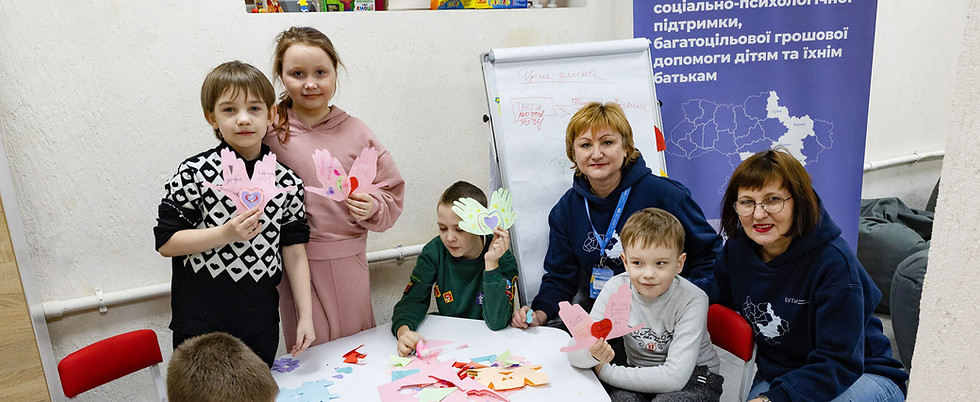
Humanitarian response program

Provision of protection, social-psychological support, MPCA to children and their parents in Zaporizhhya, Dnipro, Mykolaiv, Kherson, Kharkiv, Sumy regions
The project is implemented by the Ukrainian Education Platform in cooperation with organizations belonging to its network of Support Centers and financed by UHF.
The initiative is aimed at humanitarian response in the frontline areas of Ukraine in order to provide basic needs and psycho-social, logopedic and education support for children and their parents, suffering from the war against Ukraine. Taking into consideration multi-vector targets of the project, it is structured into three outputs, according to the activities.
1. Providing emergency multi-purpose cash assistance to the children and their parents suffered from the war to cover their basic needs.
The output covers the cash assistance for families with children that reside in the areas of project implementation and correlate with the vulnerability criteria.
2 609 people
received financial support
27 721 600,00 UAH
overall sum distributed
The support people received enabled them to meet their most urgent needs – such as food, housing, utilities, medication, and other essential expenses.
2. PSS – provision of comprehensive support to children and their parents/caregivers affected by the war in Ukraine, through psychosocial support, speech therapy, and social case management.
This component includes the establishment of Psychosocial Support Centers in each of the six regions where the project is being implemented. These centers are staffed with professionals – social workers, psychologists, and speech therapists – who offer services Vilniansk, Zaporizhzhia oblast to beneficiaries.
There are six fully operating centres. In each of the oblasts a mobile brigade, consisting of a psychologist, social worker and speech therapist provide services in different locations.
Within the project 3393 unique beneficiaries received free services from case-managers, speech therapists and psychologists. Among the available services there were: individual consultations, group sessions, trainings on PSEA and positive parenting.

-
15 rayons in 6 oblasts have been covered: Zaporizhzhia, Polohy, Novomoskovsk, Pavlohrad, Synelnykovo, Bashtanka, Voznesensk, Mykolaiv, Kharkiv, Lozova, Okhtyrka, Izium, Kryvyi Rih and Kherson;
-
6 centres of psycho-social support have been renovated. The centres and mobile brigades were provided with all the necessary equipment.
3. Mine awareness consists in raising awareness among Ukrainian children and their parents about the danger of mines.
This output covers training sessions to raise children and their parents’ awareness on the danger of mines and not exploded ammunition. The project aims to improve the situation for children and their parents who suffered from the war in the areas by providing a complex cash, psychosocial and education assistance.

We managed to cover
2 500 beneficiaries in six oblasts
Mobile teams effectively conducted information sessions even in remote areas, helping communities better understand the risks and improve safety in their daily activities.

Construction of modular housing for internally displaced people in Kirovohrad oblast

The project is implemented in partnership with Stichting World Partners and supported by Kerk in Actie (KIA).
It is part of the broader KIA Emergency response initiative, aimed at strengthening local community capacity to address wartime challenges, especially the integration of internally displaced populations. A house with four apartments was built in Kropyvnytskyi for families who lost their homes. All interior and utility works have been completed, and landscaping is ongoing. Two families have already moved in and are receiving psychosocial support from local project partners.



Improving Protection and Social Cohesion through WASH and Protection-based support to conflict-affected population in Mykolaiv, Zaporizhzhya and Dnipropetrovsk Oblast

A project to equip drinking water wells in the regions affected by the explosion of the Kakhovka hydroelectric power plant. More than 10 thousand people got access to drinking water.
Over 8 months of work, we managed to lay 5 wells in three regions of Ukraine that suffered the most after the explosion of the Kakhovka HPP's power plant. At two locations in Marganets, as well as Pokrovske, Mykolaiv and Ternuvate, our specialists drilled wells, equipped water treatment systems and installed containers for easy water collection. In some places, the drilling depth reached up to 150 meters.


«The situation in the city was critical, there was no water at all. This well solves a big problem now. More than
2 500 people in our neighborhood can now get drinking water from here», says Kateryna, a resident of Mykolaiv.
The Ukrainian Education Platform carries out important humanitarian activities, including evacuations, delivery of food, hygiene kits and medical supplies, support for shelters for affected communities and restoration of houses damaged by enemy shelling.
Since the beginning of the war, UEP has provided
2 617 900 kg of humanitarian aid to 131 000 recipients

About 13 712 people
were evacuated
The evacuation took place from the occupied and frontline territories (Mariupol, Donetsk region, Luhansk, Bakhmut, Kherson, Kostiantynivka)

More than 1500 people
have been assisted
Winterization and restoration of water supply systems in shelters and houses in the frontline areas, and old public buildings («WASH», «Winterization» projects)

Provided 70 500
sets of food
To 73 706 internally displaced persons and residents of the affected areas (Donetsk, Vinnytsia, Dnipropetrovs'k, Zaporizhzhia)

17 556 hot meals

19 100 hygiene kits distributed to households
Assistance provided to people affected by the destruction of the New Kakhovka Dam


Humanitarian principles
Adopted by UN General Assembly resolutions (46/182 and 58/114)
Humanity
The Ukrainian Education Platform prioritizes protecting the well-being of the people with whom it interacts. This may include providing educational opportunities, support and assistance to those in need, especially vulnerable groups.
Neutrality
The organization remains neutral on political conflicts and issues. We prioritize educational and humanitarian goals over political debates.
Impartiality
The organization acts objectively and without any form of discrimination, regardless of race, religion, ethnicity, gender, or other factors. All people should have equal access to education and care.
Independence
The organization is independent from external influence to ensure freedom of choice and independence in its work.
Continue